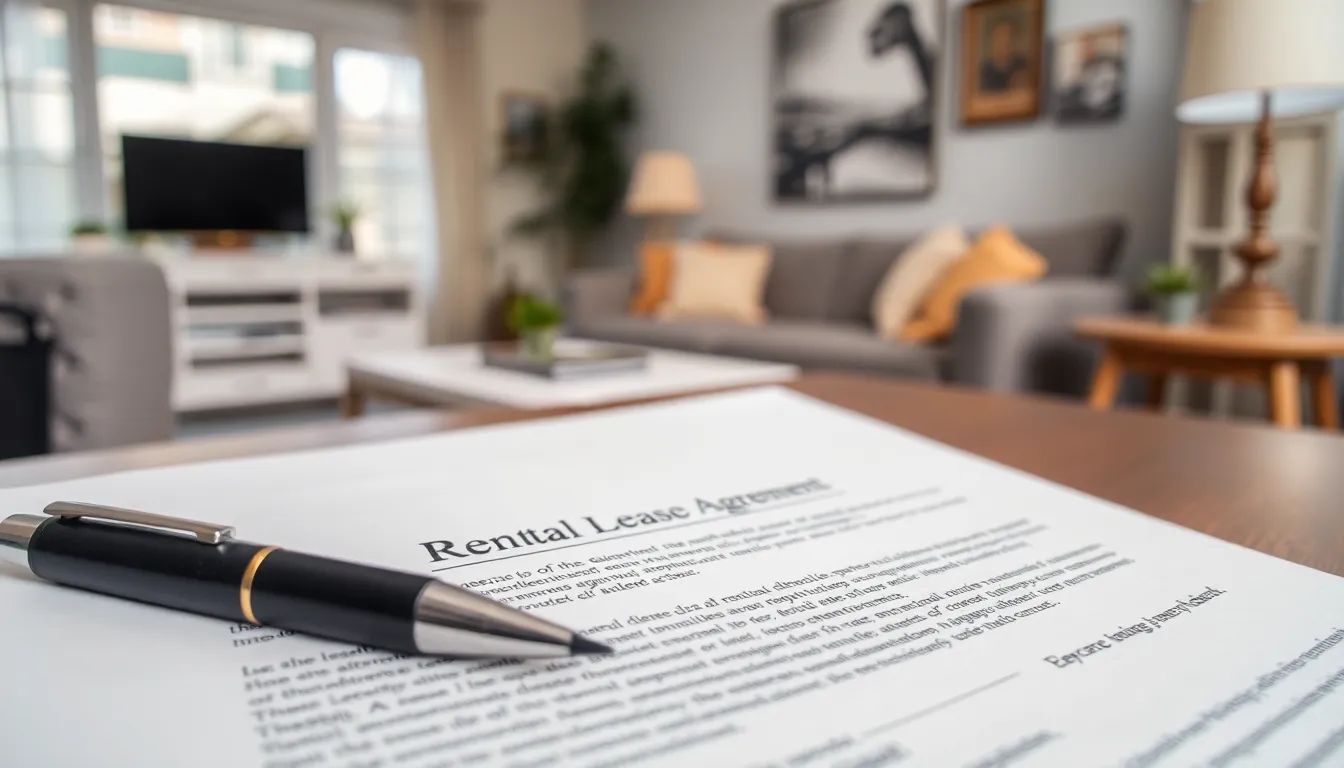Navigating the world of rental property laws can feel like trying to solve a Rubik’s Cube blindfolded. With a maze of regulations and requirements, landlords and tenants often find themselves in a tangled web of confusion. From security deposits that seem to vanish into thin air to eviction notices that pop up like unwelcome party guests, understanding these laws is crucial for anyone involved in the rental game.
Table of Contents
ToggleOverview of Rental Property Laws
Rental property laws govern the relationship between landlords and tenants. Understanding these laws is crucial for both parties to navigate disputes effectively. Specific regulations exist concerning security deposits, rent control, and eviction processes.
Laws regarding security deposits typically stipulate maximum amounts and usage. Many states require landlords to return security deposits within a specific timeframe after a tenant vacates. Failure to comply with these regulations can lead to financial penalties for landlords.
Eviction procedures must adhere to local statutes. Landlords generally must provide notice to tenants, detailing the reason for eviction. Common reasons include non-payment of rent or violation of lease terms. Depending on the jurisdiction, notice periods can vary from a few days to several weeks.
Rent control laws impact how much landlords can increase rent. Many cities enforce these regulations to protect tenants from excessive rent hikes. Landlords must familiarize themselves with these limits to avoid legal issues.
Discrimination laws ensure equal treatment for all tenants. The Fair Housing Act prohibits discrimination based on race, color, national origin, religion, sex, familial status, or disability. Violations can result in serious legal consequences for landlords.
Maintenance responsibilities also form a key aspect of rental property laws. Landlords must ensure that rental properties meet habitability standards. Tenants have the right to request repairs and maintenance in a timely manner.
Local variations can significantly influence rental property laws. Regulations may differ by state or city, making local legal guidance beneficial. Both landlords and tenants should stay informed about relevant laws to protect their rights and responsibilities.
Key Components of Rental Property Laws

Rental property laws encompass several crucial components affecting both landlords and tenants. Understanding these components ensures compliance and protection of rights.
Lease Agreements
Lease agreements serve as the foundation of landlord-tenant relationships. These contracts outline the terms and conditions of the rental arrangement, including rental amounts, duration, and obligations. Specific lease terms may vary, requiring thorough review before signing. Clear language within these agreements minimizes misunderstandings and protects both parties’ rights. It’s common for states to impose minimum requirements for lease agreements, ensuring they include essential clauses such as management responsibilities and termination conditions.
Security Deposits
Security deposits play a significant role in rental transactions. Landlords often collect these deposits to cover potential damages or unpaid rent. Regulations dictate maximum allowable amounts and deadlines for returning deposits after tenant move-out. Many jurisdictions require landlords to provide written notice detailing deposit deductions, fostering transparency. Tenants must know their rights concerning security deposits to avoid unfair practices. Proper documentation and timely returns maintain goodwill and can prevent legal disputes.
Rent Control Regulations
Rent control regulations limit how much property owners can increase rent. These laws aim to protect tenants from excessive rent hikes, ensuring housing affordability. Many cities implement specific caps on percentage increases annually, while some jurisdictions have stricter controls. Landlords must adhere to these regulations while keeping records of rent adjustments and compliance. Understanding local ordinances provides important context for both parties, especially regarding changes in rent and legal obligations surrounding pricing.
Tenant Rights Under Rental Property Laws
Understanding tenant rights under rental property laws is essential. These rights ensure fair treatment and proper living conditions.
Right to Habitability
Tenants have the right to a habitable living environment. Landlords must provide safe, sanitary conditions and comply with local health and building codes. This requirement includes timely repairs for plumbing, electricity, and heating issues. Failure to address these problems can lead to legal action. Tenants could report unresolved issues to local housing authorities. Legal recourse may include rent withholding or pursuing damages in court.
Privacy Rights
Privacy rights are fundamental for tenants. Landlords must provide reasonable notice before entering a rental unit, typically 24 to 48 hours. Exceptions exist for emergencies, where quick access is necessary. Unauthorized entry may constitute a violation of privacy rights. Tenants can seek legal remedies if landlords frequently ignore privacy regulations. Documentation of any incidents helps strengthen their case.
Anti-Discrimination Protections
Anti-discrimination protections safeguard tenants against unfair treatment. The Fair Housing Act prohibits discrimination based on race, color, religion, sex, national origin, disability, and familial status. Landlords must treat all tenants equally, ensuring fair access to rental housing. Complaints about discrimination should be reported to the Department of Housing and Urban Development (HUD). Victims of discrimination can pursue legal action for damages and seek remedy through local agencies.
Landlord Responsibilities in Rental Property Laws
Landlords hold critical responsibilities under rental property laws. Awareness of these responsibilities ensures a balanced relationship with tenants.
Maintenance and Repairs
Landlords must maintain properties in a habitable condition. This obligation includes ensuring essential services like heat, water, and electricity function properly. Timely repairs to plumbing, electrical systems, and structural components prevent unsafe living conditions. Providing proper maintenance enhances tenant satisfaction. Depending on local laws, landlords may also need to address pest control issues promptly. Full compliance with building codes protects tenants’ rights and well-being.
Security and Safety Measures
Ensuring the safety of tenants is paramount for landlords. Appropriate security measures, such as functioning locks and smoke detectors, safeguard tenants’ well-being. Regular inspections help identify potential hazards or security flaws. Compliance with safety regulations not only protects tenants but also mitigates liability risks for landlords. Providing secure environments significantly impacts tenant retention and satisfaction. Landlords must also stay updated on local safety ordinances to fulfill their legal obligations effectively.
Understanding rental property laws is crucial for both landlords and tenants. Knowledge of regulations regarding security deposits eviction procedures and maintenance responsibilities can prevent misunderstandings and disputes.
Being informed about tenant rights and landlord obligations fosters a fair and safe rental environment. Compliance with local laws not only protects individuals but also enhances the overall rental experience.
Staying updated on changes in rental laws ensures that both parties can navigate their responsibilities effectively. This awareness ultimately contributes to healthier landlord-tenant relationships and promotes a more equitable housing market.




